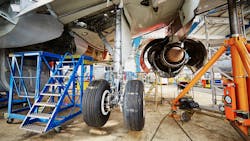Passenger Jet Parts Not Properly Checked By Japan Engine Maker
By Lisa Du
Japanese heavy-machinery maker IHI Corp. said employees didn't properly check some aircraft engines, the latest quality-control issue to dent the reputation of the country's manufacturing sector. IHI has admitted "unqualified workers conducted visual inspections of repaired engine parts at a factory in Tokyo that maintains around 150 engines a year mainly for low-cost carriers," The Japan Times reported .
Shares of IHI, which makes engine components found on Airbus SE and Boeing Co. jets, dropped as much as 5.2% after the company confirmed Japan's Transport Ministry had inspected its aircraft-engine business and determined there had been inappropriate checks. The stock was down 3.6% at 11:17 a.m. in Tokyo.
IHI is still investigating how many engines were involved and over what period, said an IHI spokeswoman. The probe is centered on IHI's Mizuho plant in Western Tokyo, which services the V2500, CF34 and PW1100G engines, the spokeswoman said.
According to IHI's website, the V2500 has been installed on Airbus A319, A320 and A321 jets, while the PW1100G powers the Airbus A320 neo. Kyodo reported that IHI told ANA Holdings Inc. and Japan Airlines Co. there were no safety issues on parts serviced by IHI.
IHI's disclosure follows failings at other domestic manufacturers. Nissan Motor Co. and Subaru Corp. have acknowledged faulty vehicle inspections, while Kobe Steel Ltd. admitted to falsifying product quality.
"This news is likely to raise a number of red flags on corporate governance," Citigroup analyst Graeme McDonald wrote in a note Tuesday. "Perhaps this is one of the knock-on effects of a growing labor shortage in Japan, but it could make observers wonder whether the importance of inspection and product quality has slipped down the agenda."
About the Author
Bloomberg
Licensed content from Bloomberg, copyright 2016.
